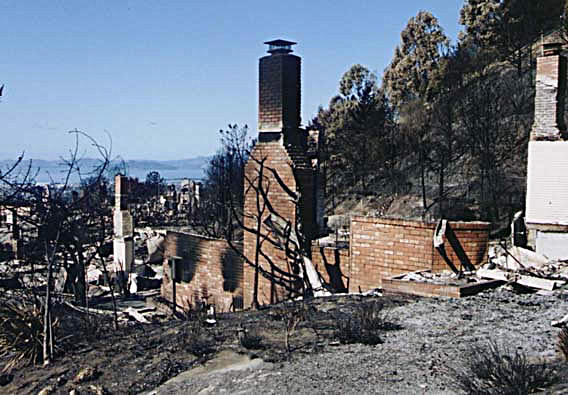A Sorrowful and Foreboding Anniversary
Saturday, October 19 marks the 22nd anniversary of the Oakland Hills Firestorm, one of the most destructive and costly wildfires in American history. Three thousand homes and twenty five lives were lost in a three-day tragedy compounded by largely avoidable mistakes (e.g., inadequate water supplies, narrow and poorly planned escape routes, and houses with highly flammable wood shake roofs). The Oakland Hills Firestorm is especially noteworthy for what it reveals about the possible future of fires in the urban-wildland interface. The technical dimensions are discussed here and in a twentieth anniversary article published two years ago, What has public safety learned from the Oakland Hills Fire?

Climate change resulting from an inexorably warming Earth is likely to exacerbate the wildfire situation, as our unfortunate friends in Australia are finding right now. The variables influencing fire behavior—temperature, wind, humidity, fuel load and fuel dryness—will change as the planet warms. Some regions will see higher rainfall and reduced risk of wildfire. Other regions—particularly in the North American West—will likely experience prolonged droughts leading to the deaths of thousands of forest trees from insect infestations and lack of water. The increased fuel load of dead and downed trees will amplify fire potential, and firefighters may discover too late that patterns of humidity, air temperature, and wind speed have changed as well.
From Climate Skepticism to the Steely Logic of Insurance
In the furor surrounding climate change there is a vast spectrum of voices ranging from clear-eyed endorsement of the fact to obstinate denial. You may read an excellent summary of denialisms in Mark McCaffrey’s article Against Denial: Just Say Know.
Paradoxically, one response to climate change reality comes from a traditionally conservative position: the realism of the insurance industry. Corey Doctorow writes
The difference between the general Big Business propaganda intended to sow doubt about climate science and the cold, hard economic reality of underwriting the risk of climate catastrophe is telling. It's like the Texas Young Earth Creationists who profess a public belief in the 5,000-year-old Biblically accurate planet, but still allow their geoscientists to direct oil-drilling operations in accord with the blasphemous four-billion-year-old Earth. Money talks, bullshit walks.
In a summit last year in Pasadena, CA between scientists and insurance industry experts on the subject of climate change fallout, Adrienne Alvord, western states director of the Union of Concerned Scientists said:
Wildfires cost California hundreds of millions of dollars each year in firefighting efforts and property damage. With climate change fueling the frequency of wildfires, Californians who live in high-risk areas are facing an additional threat to the availability and affordability of their homeowners insurance.
A 2012 study by insurance experts noted that there is considerable uncertainty and disagreement among models about whether fire activity will increase or decrease across more than half the planet. However, in areas of the world like arid western North America, models show a high level of agreement for the long term, suggesting that those regions should brace themselves for more fire.
In the long run, we found what most fear—increasing fire activity across large parts of the planet,” said lead author Max Moritz, a fire specialist in University of California Cooperative Extension. “But the speed and extent to which some of these changes may happen is surprising. These abrupt changes in fire patterns not only affect people’s livelihoods, but also they add stress to native plants and animals that are already struggling to adapt to habitat loss.
Moritz argues that the projections from this study suggest that “it is important for experts in conservation and urban development to include fire in long-term planning and risk analysis.” The study’s co-author Katharine Hayhoe, director of the Climate Science Center at Texas Tech and co-author of the study, said that
Most of the previous wildfire projection studies focused on specific regions of the world, or relied upon only a handful of climate models. Our study is unique in that we build a forecast for fire based upon consistent projections across 16 different climate models combined with satellite data, which gives a global perspective on recent fire patterns and their relationship to climate.
As we reflect this weekend on the somber anniversary of the Oakland Hills Firestorm of 1991, we should take a good look at the cumulative and accelerating impact of our collective fossil fuel-based civilization. The effects of climate change on an increasingly warming planet may put those of us in the American West in an even more precarious position.
